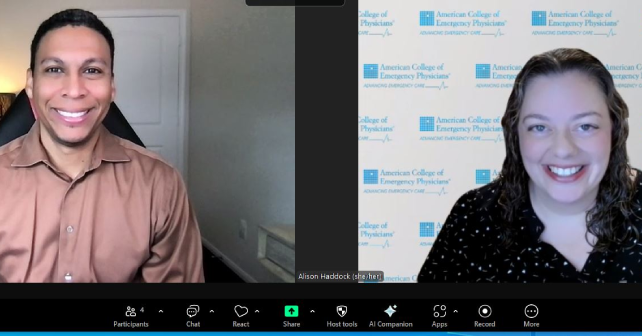
Twice a year, the Medical Editor-in-Chief of ACEP Now sits down with the ACEP President to discuss issues relevant to the College and important to emergency physicians. The questions asked are based on feedback from readers and ACEP24 attendees, as well as the ACEP Council Meeting. This article is an excerpt of the conversation I had with Alison Haddock, MD, FACEP; it has been edited for length and clarity.
Explore This Issue
ACEP Now: Vol 43 – No 12 – December 2024Dr. Cedric Dark: I was there when you made your remarks as President at the ACEP Council meeting in Las Vegas, and you mentioned to attendees that you wanted to focus on physician autonomy this year. What does physician autonomy mean to you?
Dr. Alison Haddock: When I look at what’s happening in emergency medicine right now and I try and connect the threads of all the stressors that we’re experiencing, a common thread appears. We are physicians. We are experts. We are incredibly well trained. We are ready to take on anything, but we are not being given the resources and the choices that we need to take excellent care of our patients. That boils down to a lack of autonomy.
If we have access to what we need, we can take better care of our patients. That means having access to insurance coverage for things like discharging someone to a skilled nursing facility. That means access to all the medications we need and not having to face drug shortages. It means having a say in how our workplaces are staffed and what the expectations are. I really think it’s that loss of autonomy that’s causing the distress and burnout that we’re seeing in emergency medicine right now.
Dr. Dark: That’s what I wanted to talk about next. Multiple surveys from Medscape over the past three years indicated that emergency physicians have led all physicians in burnout. What is the College doing to address that?
Dr. Haddock: The cause is the lack of autonomy. We have less autonomy than all the other specialists in medicine. Other [physicians] have different resources and different abilities to have their own practice and choose their own style. If you’re a neurologist, you can go set up your own neurology practice, hire your own staff, decide what kinds of insurance you’re going to take. We just can’t make [these decisions] in emergency medicine because of the systems and because we’ve tied ourselves predominantly to working in a hospital.





No Responses to “A Conversation with ACEP President Dr. Alison Haddock”